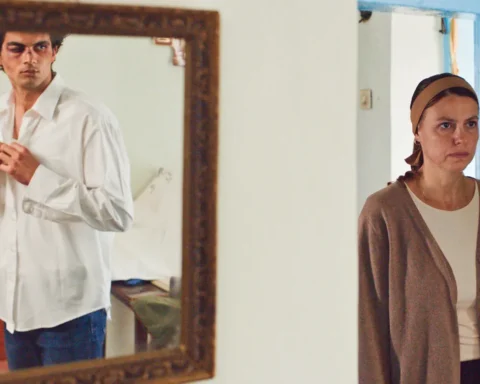Aniden (2022)
An Emotion Picture” as Varda calls her movie Documenteur. It’s a pun, but not actually. It is only Varda’s cinematic touches that carry the film beyond the dimension of being only “motion pictures”. Similar to Varda, Melisa Önel is making “a sense picture” with Aniden. That sense that’s now gone, is that real or symbolic? Could it be compensated for by any other senses? Or does that absence actually matter at all?
While Suddenly is integrating the characters with Istanbul in the credits, it welcomes the audience to the city with the sounds of ferries and seagulls. From the diegetic steamboat sounds, it connects organically to the soundtrack. With this sound bridge, the camera focuses on the clinic, close-up of Reyhan’s nose, who’s sitting next to the doctor. This is a story of a middle-aged modern woman, who suddenly loses her sense of smell, which later switches into her journey of self-seeking.
Her lost sense of smell seems to invite Reyhan to another kind of awareness, to review her own life. Contrary to the expectations, she refuses the doctor’s appointment request and turns the flow of her life in a completely different direction. She excuses her husband for a while and her family, then leaves home. We see Reyhan, who sets out on a journey where she liberates herself from the purpose and result with her reference to Alice, drifting on the streets of Istanbul, almost like an Antonioni woman who has enough courage and will to make a choice that can change her life.
To bring back the scents Reyhan first heads to the sea, probably being after the scent of Istanbul, which she realized she missed after living in Hamburg for a long time. Or the senses now have changed places, this time the repetitive sound of the ferry invites Reyhan to the seaside, to her childhood. Each visit brings another memory with it, Reyhan is floating in the footsteps of herself where she belongs, which she left 30 years ago. However, she will not get stuck in the past, nor pursue the scents she has lost; the camera moves now away from the close-up that puts the nose in focus. The transformation has now begun, Reyhan paints a portrait of Vagabond who will continue in a constant search on her own path, rejecting all the roles that society has pre-defined for her (we mentioned Varda, right?). As Reyhan surrenders herself to Istanbul, she gives a chance to everything the city has to offer, as a result of the spontaneous decisions she made using her feelings rather than the logic.
‘Human freedom precedes essence in man and makes it possible; the essence of human being is suspended in his freedom. What we call freedom is impossible to distinguish from the being of “human reality”. Man does not exist first in order to be free subsequently; there is no difference between the being of man and his being free.’ As Sartre said and as Önel turns it into a female existence.
Perhaps at this moment, the expectant audience wakes up: this will not be an ordinary story of a lost woman, nor will it be the family trying to find her, or the process of (not) recovering from a physical illness. Neither will Reyhan reveal herself to the audience from beginning till the end. On the contrary, the audience will slowly get to know her with the help of a few personalized dialogues she builds and the details created by a fine touch hidden in the frame with a magnificent cinematography. For example, in the mirror where she integrates with family photos, or in its reflection on the ferry. On her unpretentious adrift journey, she will sometimes try to win over her senses; Maybe by trying to replace the smell with touch, or to do tango by forcing the limp in her leg, but how much is she able to push her limits? At some point, she will let go of this effort and embrace her life by integrating with her blind friend through “missing one” or “not being whole”.
The successful acting of the main character Defne Kayalar carries the entire emotional burden of the movie almost by itself. The film is free of any unnecessary dialogues and exaggerated reaction or crisis scenes, focusing on whatever it feels like. And I can’t help but mention the sheet / laundry scene; you know, you lost a great piece of the meaning and more importantly the feeling when you try to translate the poem from its own language. For the same reason, this is a very strong poetic experience that I refuse to put into words, such an impressive scene that I have not quite seen recently.
While reflecting an artistic representation of the emotional and existential quest, Suddenly brings a fresh look at the Turkish cinema and it already makes me wonder about the next films of director Melisa Önel. This experience, which will spin your head in the harmonious dance of smells and sounds, deserves all the praise it receives.
Where did I see it: International Rotterdam Film Festival (European Premiere)
Nil Birinci






